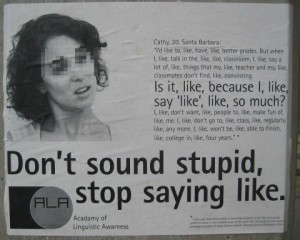Christopher Hitchens and “like”
 Source: vanityfair.com
Source: vanityfair.com
I came across a very interesting (if slightly old) article on the Vanity Fair site recently on the “like” pandemic in American English. Perhaps most noticeable in female Californians’ accents, some see the over and misuse of “like” as a scourge on the English language, some simply as a harmless form of teen slang, others see it as the way the language is evolving.
Christopher Hitchens talks not only of how the word has pervaded the daily vocabulary of American teens, but also how it has near enough completely replaced the use of the word “as” when forming similes or comparisons.
Here’s a quote from the article; you can read the whole thing here.
So it can be of use to a natural raconteur. Ian McEwan rather surprised me when I asked him about “like,” telling me that “it can be used as a pause or a colon: very handy for spinning out a mere anecdote into a playlet that’s full of parody and speculation.” And also of hyperbole, as in “She’s been out with, like, a million guys.”
Its other main use is principally social, and defensive. You will have noticed the way in which “uptalk” has also been spreading among the young. “Uptalk” can be defined as an ostensibly declarative sentence that is uttered on a rising note of apology and that ends with an implied question mark. An example: the statement “I go to Columbia University?,” which seems to say, “If that’s all right with you.” Just as the humble, unassuming, assenting “O.K.” has deposed the more affirmative “Yes,” so the little cringe and hesitation and approximation of “like” are a help to young people who are struggling to negotiate the shoals and rapids of ethnic identity, the street, and general correctness. To report that “he was like, Yeah, whatever” is to struggle to say “He said” while minimizing the risk of commitment.
